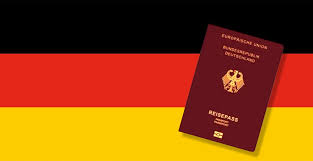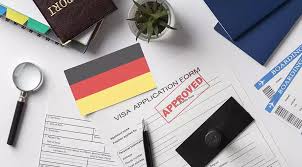Germany remains one of the most attractive destinations for immigrants seeking stable employment, high salaries, and an excellent quality of life. With a strong economy, worker shortages in key industries, and a welcoming immigration policy, Germany offers countless opportunities for skilled professionals worldwide.
This comprehensive guide covers everything you need to know about finding jobs in Germany as an immigrant, including:
- The best industries hiring foreign workers
- Work visa requirements and application steps
- How to get a job offer from Germany before moving
- Salary expectations and living costs
- Tips to boost your chances of employment
Whether you're an IT specialist, healthcare professional, engineer, or tradesperson, this guide will help you navigate the German job market and secure a work visa successfully.
Why Work in Germany? Key Benefits for Immigrants
Germany is actively recruiting skilled foreign workers to fill labor shortages. Here’s why you should consider working there:
✅ High Salaries – Germany offers some of the best wages in Europe, especially in engineering, IT, and healthcare.
✅ Strong Job Market – Over 2 million job vacancies in 2024, with many employers offering visa sponsorship.
✅ Work-Life Balance – Germans enjoy 30+ days of paid vacation, strong labor laws, and flexible working conditions.
✅ Path to Permanent Residency – After 4-5 years, you can apply for a settlement permit (permanent residency).
✅ Free Education & Healthcare – Public healthcare is mandatory, and university education is tuition-free (even for immigrants).
With these benefits, it’s no surprise that Germany is a top choice for professionals from India, the Philippines, Brazil, Nigeria, and other countries.
Top Industries Hiring Foreign Workers in Germany (2024)
Germany has a massive labor shortage, especially in these high-demand fields:
1. Information Technology (IT) & Software Development
- Jobs in demand: Software Engineers, Data Scientists, Cybersecurity Experts, Cloud Specialists
- Average salary: €55,000 – €100,000+ per year
- Visa sponsorship: Very common (Germany needs 400,000+ IT workers by 2026)
2. Healthcare & Nursing
- Jobs in demand: Doctors, Nurses, Caregivers, Medical Technicians
- Average salary: €45,000 – €80,000+
- Visa sponsorship: Fast-track visa options for healthcare workers
3. Engineering & Manufacturing
- Jobs in demand: Mechanical, Electrical, Automotive Engineers
- Average salary: €50,000 – €90,000
- Visa sponsorship: Common in automotive (BMW, Volkswagen, Siemens)
4. Skilled Trades (Ausbildung Jobs)
- Jobs in demand: Electricians, Plumbers, Welders, HVAC Technicians
- Average salary: €35,000 – €60,000
- Visa sponsorship: Many employers hire from abroad
5. Finance & Business
- Jobs in demand: Accountants, Financial Analysts, Project Managers
- Average salary: €45,000 – €75,000
- Visa sponsorship: Possible in multinational companies
If you have experience in any of these fields, your chances of getting a job in Germany with visa sponsorship are very high.
Germany Work Visa Requirements for Immigrants
To work in Germany, you’ll need a work visa (Employment Visa). The requirements include:
📌 Valid job offer from a German employer
📌 Recognized qualifications (degree or vocational certificates)
📌 Proof of financial stability (€12,000+ in savings for some visas)
📌 Health insurance (mandatory for all workers)
📌 Clean criminal record
Types of German Work Visas:
- Skilled Worker Visa – For professionals with a university degree or vocational training.
- EU Blue Card – For highly skilled workers earning €45,300+ per year (€39,682 for IT & shortage jobs).
- Job Seeker Visa – Allows you to stay for 6 months to find a job.
- Freelance Visa – For self-employed professionals (artists, consultants, developers).
Pro Tip: If you don’t have a job offer yet, apply for a Job Seeker Visa to search for work while in Germany.
How to Find a Job in Germany from Abroad
1. Use German Job Portals
- Make it in Germany (Official government site)
- LinkedIn Germany (Best for corporate jobs)
- Indeed Germany (General job listings)
- StepStone (Engineering & IT jobs)
2. Apply Through Recruitment Agencies
Many German companies hire via agencies like:
- Hays Germany
- Adecco Germany
- Randstad Germany
3. Network with German Employers
- Attend virtual job fairs (like “CareerBridge Europe”)
- Join Facebook & LinkedIn groups for expats in Germany
- Contact German companies directly
4. Learn Basic German (B1 Level Preferred)
While many jobs accept English speakers, knowing German boosts your chances. Use apps like Duolingo, Babbel, or Goethe-Institut courses.
Average Salaries & Cost of Living in Germany
Monthly Salaries (Before Tax)
| Profession | Salary Range (€) |
|---|---|
| Software Engineer | €4,500 – €7,500 |
| Nurse | €3,000 – €4,500 |
| Mechanical Engineer | €4,000 – €6,500 |
| Electrician | €2,800 – €4,200 |
| Accountant | €3,500 – €5,500 |
Cost of Living (Monthly)
- Rent (1-bed apartment): €800 – €1,500 (cheaper in smaller cities)
- Groceries: €200 – €400
- Public Transport: €50 – €100
- Health Insurance: €200 – €400
Good news: Taxes are high, but salaries cover living costs comfortably.
How to Get a Work Visa Faster – 5 Tips
- Target Shortage Jobs (IT, healthcare, engineering) for quicker approval.
- Get Your Degree Recognized (Use ANABIN for foreign credential checks).
- Apply for an EU Blue Card (Faster processing if you meet salary requirements).
- Hire an Immigration Lawyer (Reduces rejection risks).
- Prepare a Strong CV in German Format (Include a “Lebenslauf”).
Success Stories: Immigrants Who Got Jobs in Germany
- Ahmed (Egypt) – IT Specialist
- Found a job on LinkedIn, moved with an EU Blue Card.
- Now earns €85,000/year in Munich.
- Maria (Philippines) – Nurse
- Recruited by a Berlin hospital via Make it in Germany.
- Got her visa in 3 months.
- David (Nigeria) – Mechanical Engineer
- Applied through Hays Germany, now works at BMW.
These stories prove that with the right strategy, you can succeed too!
Final Checklist Before Applying
✅ Find a job offer (Use job portals & agencies)
✅ Check visa requirements (Skilled Worker, EU Blue Card, etc.)
✅ Prepare documents (Passport, degree, job contract)
✅ Learn basic German (Improves job chances)
✅ Apply for visa at German embassy
Start Your German Job Search Today!
Germany offers endless opportunities for skilled immigrants. Whether you're in IT, healthcare, engineering, or trades, there’s a high chance you can secure a well-paying job with visa sponsorship.
Next Steps:
- Update your CV in German format.
- Apply for jobs on LinkedIn, Indeed, and Make it in Germany.
- Prepare for interviews (research German work culture).
Your dream job in Germany is waiting – start applying today! 🚀
Need More Help?
- Visit the official German visa website: www.germany-visa.org
- Join expat Facebook groups for advice
- Consult an immigration lawyer for personalized guidance
This guide covers everything you need to work in Germany as an immigrant in 2024. Bookmark it and take action now!

